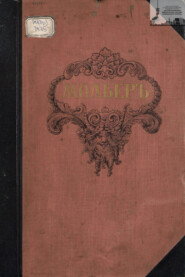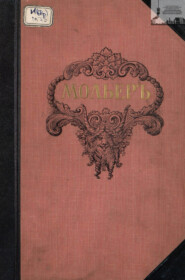По всем вопросам обращайтесь на: info@litportal.ru
(©) 2003-2024.
✖
The Bores
Год написания книги
2017
Настройки чтения
Размер шрифта
Высота строк
Поля
DAM. (To L'Epine). Yes, I have discovered that my niece, in spite of my care, is to receive Éraste in her room to-night, alone.
LA R. (To his companions). What do I hear those people saying of our master? Let us approach safely, without betraying ourselves.
DAM. (To L'Epine). But before he has a chance of accomplishing his design, we must pierce his treacherous heart with a thousand blows. Go and fetch those whom I mentioned just now, and place them in ambush where I told you, so that at the name of Éraste they may be ready to avenge my honour, which his passion has the presumption to outrage; to break off the assignation which brings him here, and quench his guilty flame in his blood.
LA R. (Attacking Damis with his companions). Before your fury can destroy him, wretch! you shall have to deal with us!
ER. Though he would have killed me, honour urges me here to rescue the uncle of my mistress. (To Damis). I am on your side, Sir. (He draws his sword and attacks La Rivière and his companions, whom he puts to flight.)
DAM. Heavens! By whose aid do I find myself saved from a certain death?
To whom am I indebted for so rare a service?
ER. (Returning). In serving you, I have done but an act of justice.
DAM. Heavens. Can I believe my ears! Is this the hand of Éraste?
ER. Yes, yes, Sir, it is I. Too happy that my hand has rescued you: too unhappy in having deserved your hatred.
DAM. What! Éraste, whom I was resolved to have assassinated has just used his sword to defend me! Oh, this is too much; my heart is compelled to yield; whatever your love may have meditated to-night, this remarkable display of generosity ought to stifle all animosity. I blush for my crime, and blame my prejudice. My hatred has too long done you injustice! To show you openly I no longer entertain it, I unite you this very night to your love.
SCENE VI. – ORPHISE, DAMIS, ÉRASTE
ORPH. (Entering with a silver candlestick in her hand). Sir, what has happened that such a terrible disturbance…
DAM. Niece, nothing but what is very agreeable, since, after having blamed, for a long time, your love for Éraste, I now give him to you for a husband. His arm has warded off the deadly thrust aimed at me; I desire that your hand reward him.
ORPH. I owe everything to you; if, therefore, it is to pay him your debt. I consent, as he has saved your life.
ER. My heart is so overwhelmed by this great miracle, that amidst this ecstasy, I doubt if I am awake.
DAM. Let us celebrate the happy lot that awaits you; and let our violins put us in a joyful mood. (As the violins strike up, there is a knock at the door).
ER. Who knocks so loud?
SCENE VII. – DAMIS, ORPHISE, ÉRASTE, L'ÉPINE
L'EP. Sir, here are masks, with kits and tabors.
(The masks enter, filling the stage).
ER. What! Bores for ever? Hulloa, guards, here. Turn out these rascals for me.
BALLET TO ACT III
First Entry.
Swiss guards, with halberds, drive out all the troublesome masks, and then retire to make room for a dance of
[Footnote: The origin of the introduction of the Swiss Guards (mercenaries) in the service of the French and other foreign powers may be ascribed to the fact that Switzerland itself, being too poor to maintain soldiers in time of peace, allowed them to serve other nations on condition of coming back immediately to their own cantons in time of war or invasion.
It is particularly with France that Switzerland contracted treaties to furnish certain contingents in case of need. The first of these dates back as far as 1444 between the Dauphin, afterwards Charles VII., and the different cantons. This Act was renewed in 1453, and the number of soldiers to be furnished was fixed once for all, the minimum being 6,000, and the maximum 16,000. The Helvetians, who until 1515 had always been faithful to their engagements, turned traitors in that year against Francis I., who defeated them at Marignan. But the good feeling was soon afterwards re-established, and a new treaty, almost similar to the former, restored the harmony between the two nations.
Another document is extant, signed at Baden in 1553, by which the cantons bind themselves to furnish Henry II. with as many troops as he may want. It is particularly remarkable, inasmuch as it served as a basis for all subsequent ones until 1671. These conventions have not always been faithfully carried out, for the Swiss contracted engagements with other nations, notably with Spain, Naples, and Sardinia, and even with Portugal. At the commencement of the campaign of 1697, Louis XIV. had, notwithstanding all this, as many as 32,000 Swiss in his service, the highest number ever attained. The regulations for the foreign colonels and captains in their relations among themselves, and with the French Government, were not unlike those in force at present for the native soldiery in our Indian possessions. Towards the end of Louis XIV.'s reign the number decreased to 14,400, officers included; it rose in 1773 to 19,836, and during the wars of 1742-48. to 21,300. The ebb and flow of their numbers continued from that time until the Revolution of 1830, when they were finally abolished.
They received a much higher pay than the national troops, and had besides this many other advantages, one of them being that the officers had in the army the next grade higher than that which they occupied in their own regiments; for instance, the colonel of a Swiss regiment had the rank of a major-general, and retired on the pay of a lieutenant-general, &c. They enjoyed the same privileges, with some slight modifications, wherever they served elsewhere.]
Second Entry.
Four shepherds and a shepherdess, who, in the opinion of all who saw it, concluded the entertainment with much grace.
LA R. (To his companions). What do I hear those people saying of our master? Let us approach safely, without betraying ourselves.
DAM. (To L'Epine). But before he has a chance of accomplishing his design, we must pierce his treacherous heart with a thousand blows. Go and fetch those whom I mentioned just now, and place them in ambush where I told you, so that at the name of Éraste they may be ready to avenge my honour, which his passion has the presumption to outrage; to break off the assignation which brings him here, and quench his guilty flame in his blood.
LA R. (Attacking Damis with his companions). Before your fury can destroy him, wretch! you shall have to deal with us!
ER. Though he would have killed me, honour urges me here to rescue the uncle of my mistress. (To Damis). I am on your side, Sir. (He draws his sword and attacks La Rivière and his companions, whom he puts to flight.)
DAM. Heavens! By whose aid do I find myself saved from a certain death?
To whom am I indebted for so rare a service?
ER. (Returning). In serving you, I have done but an act of justice.
DAM. Heavens. Can I believe my ears! Is this the hand of Éraste?
ER. Yes, yes, Sir, it is I. Too happy that my hand has rescued you: too unhappy in having deserved your hatred.
DAM. What! Éraste, whom I was resolved to have assassinated has just used his sword to defend me! Oh, this is too much; my heart is compelled to yield; whatever your love may have meditated to-night, this remarkable display of generosity ought to stifle all animosity. I blush for my crime, and blame my prejudice. My hatred has too long done you injustice! To show you openly I no longer entertain it, I unite you this very night to your love.
SCENE VI. – ORPHISE, DAMIS, ÉRASTE
ORPH. (Entering with a silver candlestick in her hand). Sir, what has happened that such a terrible disturbance…
DAM. Niece, nothing but what is very agreeable, since, after having blamed, for a long time, your love for Éraste, I now give him to you for a husband. His arm has warded off the deadly thrust aimed at me; I desire that your hand reward him.
ORPH. I owe everything to you; if, therefore, it is to pay him your debt. I consent, as he has saved your life.
ER. My heart is so overwhelmed by this great miracle, that amidst this ecstasy, I doubt if I am awake.
DAM. Let us celebrate the happy lot that awaits you; and let our violins put us in a joyful mood. (As the violins strike up, there is a knock at the door).
ER. Who knocks so loud?
SCENE VII. – DAMIS, ORPHISE, ÉRASTE, L'ÉPINE
L'EP. Sir, here are masks, with kits and tabors.
(The masks enter, filling the stage).
ER. What! Bores for ever? Hulloa, guards, here. Turn out these rascals for me.
BALLET TO ACT III
First Entry.
Swiss guards, with halberds, drive out all the troublesome masks, and then retire to make room for a dance of
[Footnote: The origin of the introduction of the Swiss Guards (mercenaries) in the service of the French and other foreign powers may be ascribed to the fact that Switzerland itself, being too poor to maintain soldiers in time of peace, allowed them to serve other nations on condition of coming back immediately to their own cantons in time of war or invasion.
It is particularly with France that Switzerland contracted treaties to furnish certain contingents in case of need. The first of these dates back as far as 1444 between the Dauphin, afterwards Charles VII., and the different cantons. This Act was renewed in 1453, and the number of soldiers to be furnished was fixed once for all, the minimum being 6,000, and the maximum 16,000. The Helvetians, who until 1515 had always been faithful to their engagements, turned traitors in that year against Francis I., who defeated them at Marignan. But the good feeling was soon afterwards re-established, and a new treaty, almost similar to the former, restored the harmony between the two nations.
Another document is extant, signed at Baden in 1553, by which the cantons bind themselves to furnish Henry II. with as many troops as he may want. It is particularly remarkable, inasmuch as it served as a basis for all subsequent ones until 1671. These conventions have not always been faithfully carried out, for the Swiss contracted engagements with other nations, notably with Spain, Naples, and Sardinia, and even with Portugal. At the commencement of the campaign of 1697, Louis XIV. had, notwithstanding all this, as many as 32,000 Swiss in his service, the highest number ever attained. The regulations for the foreign colonels and captains in their relations among themselves, and with the French Government, were not unlike those in force at present for the native soldiery in our Indian possessions. Towards the end of Louis XIV.'s reign the number decreased to 14,400, officers included; it rose in 1773 to 19,836, and during the wars of 1742-48. to 21,300. The ebb and flow of their numbers continued from that time until the Revolution of 1830, when they were finally abolished.
They received a much higher pay than the national troops, and had besides this many other advantages, one of them being that the officers had in the army the next grade higher than that which they occupied in their own regiments; for instance, the colonel of a Swiss regiment had the rank of a major-general, and retired on the pay of a lieutenant-general, &c. They enjoyed the same privileges, with some slight modifications, wherever they served elsewhere.]
Second Entry.
Four shepherds and a shepherdess, who, in the opinion of all who saw it, concluded the entertainment with much grace.

















